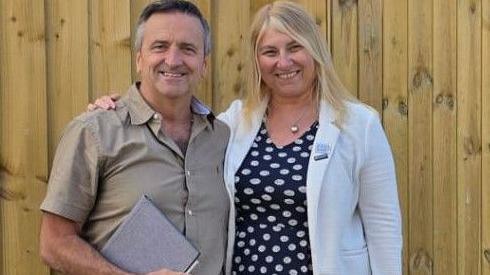First stage of bomb removal repairs completed

The first phase of repair work has been completed at homes affected by the bomb removal in Keyham
- Published
The first stage of repairs to homes damaged during the removal of a World War Two bomb in Plymouth earlier this year have been completed.
Plymouth City Council said three gardens in St Michael Avenue, Keyham, have had their walls repaired, new back gates installed and fences put up.
Damage was caused to the properties as the army removed an unexploded 500kg (1,102lb) German bomb from a garden on 20 February.
The council said the next stage of work would restore the gardens, and it hoped the repairs would be completed in July.
Thirteen local companies volunteered their time, materials and equipment to help rebuild the boundaries of the properties, the council said.
Building Plymouth, a council-led partnership with the construction industry that has been leading the repairs project, said it has support in place from several firms for the next stage of the works.
Emma Hewitt, Building Plymouth lead for the council, said: “The contribution from the local construction industry has been outstanding.
"I have been bowled over by the number of contractors, consultants and suppliers willing to give their time, resources, equipment and materials for free to help these residents.
“It wasn’t the council’s role to pay for the repairs, but thanks to our sterling construction industry, Building Plymouth has been able to step-up and help-out."
'Moving forward'
Martyn Hammond, who is one of the residents whose home was damaged, said he was very pleased with the work that has been done.
"The Building Plymouth team have done an amazing job thank you to everyone involved, I’m so pleased with my new fence," he said.
"I'm really excited to be moving forward with the garden reinstatement next.
"My green fingers are coming back and I so look forward to enjoying time in my restored garden over the summer."
More than 10,000 people had to be moved out of the area as military personnel took the bomb to the sea, where it was detonated on 23 February.
The Ministry of Defence said the effort to remove the bomb was "one of the largest UK peacetime evacuation operations".
Follow BBC Devon on X (formerly Twitter), external, Facebook, external and Instagram, external. Send your story ideas to spotlight@bbc.co.uk, external.
Related topics
- Published8 May 2024

- Published23 February 2024

- Published24 February 2024
